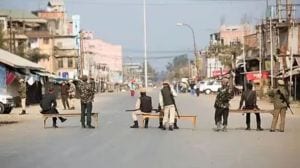So, Who Are We?
In this unsettling novel, an accident survivor accuses his sister of being an imposter

In a bare synopsis it would read like a thriller. A 27-year-old man, Mark Schluter, lies comatose in hospital after his truck overturns one cold winter night in rural Nebraska. His sister, Karin, his only remaining family, rushes back from her public relations job to care for him. Investigators wonder that his truck8217;s were just one of three pair of tracks veering off the road. On his bedside, she finds a paper with these words, the writing like 8220;immigrant crawl from a century ago8221;: 8220;A am No One/ but Tonight on North Line Road/ GOD led me to you/ so You could Live/ and bring back someone else.8221;
As Mark slowly recovers, Karin cannot avert the reappraisal imposed by her old home. Focussing on Mark brings back memories of a difficult and fraught childhood. Worries that he8217;s suffered brain damage lead her to medical texts and quick study of cognition and memory. With Mark8217;s recovery bound to be long, she leaves her job, bringing on the disconcerting realisation of how imperceptibly she allowed dashed opportunities to curb her ambition. It is like seeing herself afresh, almost as a stranger.
This feeling of being a stranger to herself is accentuated when Mark regains consciousness. She looks like his older sister, he concedes, but he cannot believe it is her. She is, he contends, an imposter. Doctors say it8217;s a case of Capgras Syndrome, whereby a person loses his emotional memory. The unusual manifestation of this amnesia brings a well-known neurologist to his bedside. Dr Weber, a bestselling Oliver Sacks kind of figure, is himself suffering a lack of credibility after critical articles in the national press.
If that were all to Powers8217;s unsettling novel, the narrative would still be compelling. What8217;s the mystery of the note? Is Karin who she says she is? What8217;s Weber all about? And that note?
But The Echo Maker is a grander narrative. The story of the Schluter siblings is laid over the seasonal migration of sandhill cranes to Nebraska. By now, as America adds to the invasion of Afghanistan at novel8217;s beginning with another in Iraq, the cranes are a major tourist attraction. Poetically overwriting this timeless migration, Powers uses their longer, instinctive memory to highlight the shorter term and personalised memories humans must constantly take stock of in their daily struggle for meaningful survival.
With technology, memory and identity are in any case beginning to be seen as constructible entities. Mark, in a loser job, is a regular at online chatrooms, using assumed identities to fill the loneliness he is personally inclined towards.
It is easy to compare the events of this patch of Nebraska with evolutionary patterns and governmental decision-making. Karin, so long in flight from her past, is drawn to the insight that it is natural to put oneself through little tests. How she tackles them will define how she sees herself. America in the winter of 2002 is going through the process in a most muscular way, in contrast to the migratory birds8217; nonconfrontational, almost instinctive responses to ecological changes. Powers8217;s achievement in the end is to give prominence to the backdrop without in any way diminishing the stature and mystery of the Schluter siblings.
- 01
- 02
- 03
- 04
- 05






























